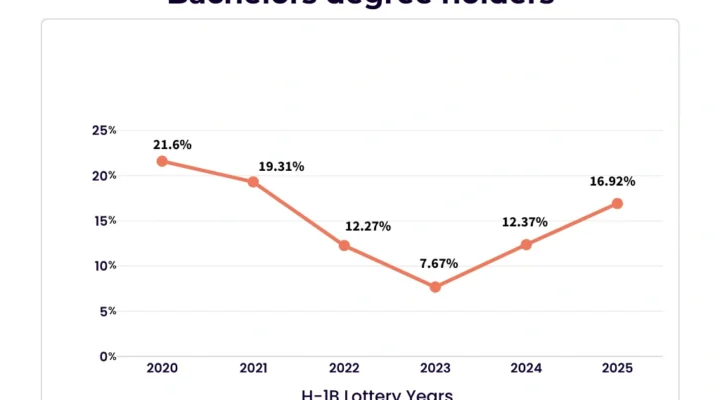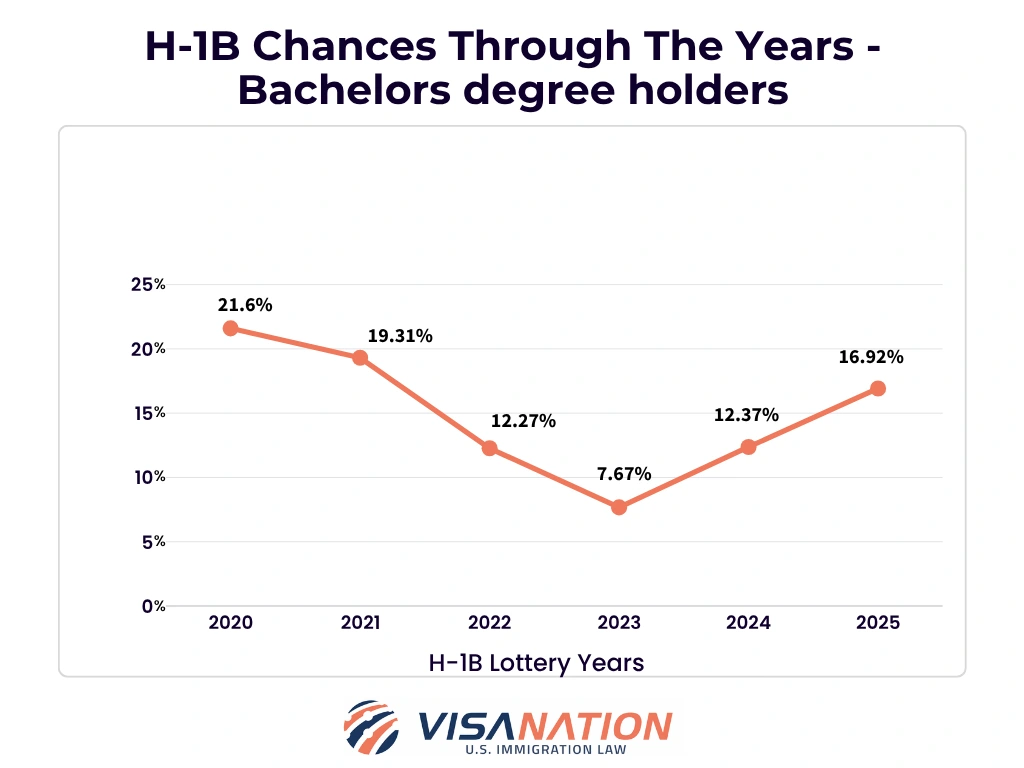It’s not easy to get a decent estimate of your H-1B visa lottery chances due to many complicated factors affecting your odds.
We understand this frustration, so we created this guide to explain those factors and show how they affect your chances. Within, we explore historical trends, demonstrate how your degree type influences your chances, examine the rise in lottery participation over the years, and highlight USCIS’s efforts to combat fraud. Plus, we offer practical tips to improve your chances.
Bookmark this page for the latest H-1B lottery news, odds, and results.
Don’t leave your chances to luck. Let VisaNation help.
Key terms
H-1B Visa Lottery: A lottery system conducted by USCIS using random selection, including two rounds. One with 65,000 available visas, the regular cap (6,800 of these visas are set aside for Chile and Singapore citizens), and an additional round of 20,000 visas, the Master’s Cap, also known as the advanced degree exemption.
H-1B Lottery Chances for 2025-2026 Cap Season
Your chances for the 2026-2027 H-1B visa lottery depend on various factors, including:
- Demand for H-1B visas.
- Accurate submission of your H-1B registration.
- Filing costs for employers.
- Whether you have a Bachelor’s degree or an advanced degree (Master’s or higher).
- New USCIS measures addressing H-1B fraud.
Two of the arguably most significant factors affecting your odds in the 2025-2026 visa lottery are
- Increasing demand
- Degree type (Bachelor’s vs Master’s).
Increasing demand for H-1B visas
The demand for H-1B visas through the visa lottery has had a dramatic increase over the years. Look at the chart below:

Eligible H-1B Registrations and Total Selections Over the Years
In 2020, 269,424 eligible registrants participated in the visa lottery. Looking at 2024, the number increased 74% to 470,342, and in 2025 decreased to 343,981. Meanwhile, the total lottery selections have remained relatively stable over time. Overall, this shows the chances for earning an H-1B visa have become increasingly difficult.
It’s also important to look at degree type:
H-1B Chances for Bachelor’s Degree Graduates
For Bachelor’s degree graduates not from Chile or Singapore, you will be competing for 58,200 visa slots. This is because 6,800 of the 65,000 H-1b visas in the regular cap round are exclusive to Chile and Singapore – roughly 11% fewer visas. Additionally, 20,000 visas are exclusive to Master’s degrees or higher
From there, the chances of selection are calculated by dividing eligible H-1B registrations by available visas for Bachelor’s graduates (58,200).
See the odds over the years:
From the above chart, the probability of securing an H-1B visa for Bachelor’s graduates has been falling since 2020 due to increased registrations. However, 2024 and 2025 have seen an increase in odds.
How Does a Master’s Degree Affect Your H-1B Visa Lottery Odds?
For Master’s graduates, if USCIS doesn’t select your registration in the first round, you have an additional chance. This is because they enter your application into a second round, the H-1B Master’s pool of 20,000 available visas.
This second round significantly boosts your odds compared to applicants with only a Bachelor’s degree. In 2019, USCIS stated that this additional round provided Master’s graduates with a 16% higher chance of selection.
Additionally, because the H-1B Master’s cap usually receives fewer applications, this generally improves your chances of being selected.

*VisaNation immigration attorneys estimate that if approximately 35% of all eligible registrations in the visa lottery hold a Master’s degree, the odds of a Master’s graduate securing an H-1B visa for applicants, excluding Chile or Singapore, would be as above.
*Disclaimer: This is an approximation, as USCIS doesn’t always release data on the breakdown of a Master’s degree vs a Bachelor’s degree.
Over the last years, H-1B chances dropped dramatically for Master’s degree holders, but have since experienced a swift recovery over the past two H-1B lottery cycles, with odds improving to over 30%.
Similar to the Bachelor’s degree graduates, competition has impacted the odds, but a Master’s degree nonetheless greatly improves your odds of securing an H-1B visa.
Tips to Increase Your H-1B Lottery Odds
There are a few strategies that can help you increase your chances of getting an H-1B visa.
- Master’s Cap: The most obvious way to help your chances is to qualify for the master’s degree (or higher) cap exemption. Being in the master’s degree cap-exemption pool increases your chances by up to 16% percentage points. Don’t file your petition after the cap is reached because then you have zero chance of obtaining an H-1B visa for the 2025–2026 fiscal year.
- Apply Only Once: Submitting multiple applications might seem like a good strategy, but it can lead to rejection. If a single employer submits two applications for the same employee, both will be rejected. The USCIS also scrutinizes multiple applications from affiliated companies for the same employee.
- Ensure Your Employer Meets USCIS Requirements: A common reason for H-1B application failure is the employer not meeting USCIS standards. Verify that your employer has a good track record with successful H-1B applications, can provide the necessary documentation, and has the financial stability to pay your salary.
- Seek Immigration Consultation: Navigating the complexities of H-1B applications can be challenging. A consultation with an experienced business immigration attorney can help ensure your application is well-prepared, compliant with legal requirements, and has the best chance of success.
How to Check H-1B Lottery Results
There are a few ways to see if you were selected in the H-1B lottery. Here’s how to check your lottery status:
- Check if USCIS Cashed the Application Fee Check: If USCIS has cashed your H-1B application fee check, it’s a sign your petition may have been selected.
- Look for a 13-digit Receipt Number: Your employer will receive a 13-digit receipt number by mail if your petition is selected. Check the status of this number on the USCIS Case Status Tool Online. You may watch our short video below to learn how to use the USCIS tool.
- Receipt of Stamped I-797 Form: All lottery winners receive a stamped I-797 Form from Immigration and Naturalization Services, indicating selection in the lottery.
- For Nonimmigrant Students in the Advanced Degree Pool: Visit the Student and Exchange Visitor Information (SEVIS) website to check your status, as this site is regularly updated with lottery winners.
- 24-Month OPT Extension for STEM Students: If you are an F1 student with a STEM degree and your employer is enrolled in E-Verify, you can apply for a 24-month extension of post-completion OPT employment authorization if you received an initial OPT grant based on your STEM degree. Check your status by visiting the Student and Exchange Visitor Information (SEVIS) website.
After the registration window closes, all registrations will say “Submitted.” Some will later change to “Selected,” “Denied,” or “Not Selected.” If USCIS needs to increase the registrations for either cap during the remainder of the fiscal year, it will select more registrations from the “Submitted” pool. After October 1, 2024, the remaining “Submitted” registrations will change to “Not Selected.”
What if the H-1B Lottery Results Reveal I Wasn’t Selected?
If your petition is not selected in the lottery, USCIS will return your petition and filing fee unless determined to be a duplicate filing, in which case USCIS will return it without the fee.
If your petition was marked as “wait-listed,” it may replace an initially selected petition later found to be ineligible or denied. The USCIS has confirmed that it selects more petitions than are given in the cap in anticipation of some being withdrawn or rejected.
Find out all about Top H-1B Visa Myths.
USCIS Anti-Fraud Measures
USCIS expressed concern over a sharp rise in employers submitting multiple H-1B registrations for the same applicant, suspecting that some may be exploiting the system. Comparing the numbers between 2023 and 2024, the figures have risen significantly from 165,180 to 408,891, respectively. This marks an increase of 147%, with employers submitting an additional 243,711 multiple H-1B registrations.
Investigations by USCIS show the scale at 400,000 fraudulent registrations— almost half of all the registrations filed. To address fraud, USCIS has made it clear that employers attempting two entries into the registration process for one employee, in any manner, may lead USCIS to consider their registrations invalid. In such cases, USCIS has the authority to deny or revoke the approval of any H-1B lottery 2025 petitions, such as when both a passport and a travel document are submitted.
Furthermore, if an employer submits multiple registrations for a single beneficiary, all registrations for that beneficiary by the employer will be deemed invalid. USCIS holds the right to deny or revoke the approval of any petition filed for the beneficiary based on these invalid registrations.
Lastly, USCIS reiterates its power to deny H-1B petitioners or revoke an approved petition under certain circumstances. This includes instances where there is a change in the beneficiary’s identifying information from the registration to the petition, false attestation or invalidity of the underlying registration, an invalid registration fee, or when the H-1B cap-subject petition is not based on a valid registration.
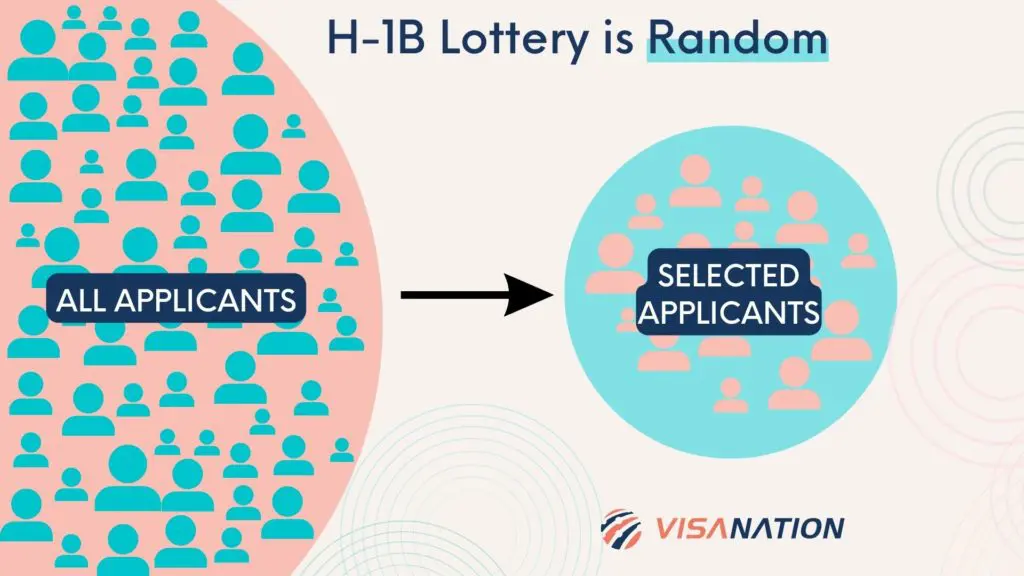
How the H-1B Lottery Works
Here’s a brief overview of how the H-1B cap lottery functions and your H-1B lottery chances for the fiscal year.
- The computer-generated selection process picked 65,000 from the entire pool of cap-subject petitions. Those who were not accepted and were eligible for the advanced degree exemption were transferred to the master’s cap pool for a second chance at selection. Because the regular cap is done first, followed by the master’s cap, USCIS has stated that your odds of selection as an advanced-degree holder increase by up to 16% versus the old cap ordering system.
- The second lottery selection picked 20,000 to meet the master’s H-1B cap.
- Singapore and Chilean citizens have 6,800 spots specifically reserved for them.
- Not all petitions are subject to the cap. Cap-exempt petitions are those that:
- Previously counted against the cap
- Are intended to extend or lengthen the H-1B worker’s time in the country (H-1B visa extension)
- Change the employment terms for current H-1B employees (i.e., location, responsibilities, duties, etc.)
- Transfer an H-1B status to a different employer
- Allow the worker to be employed in a second position
- Are filed by a cap-exempt sponsor, which is either an institute of higher education, a nonprofit organization associated with an institute of higher education, or a governmental research center.
All H-1B registrations must be submitted during the registration window, predicted to be held in March. If you submit your registration outside this window, USCIS will issue a denial.
All H-1B registrations submitted at any time during this window will have an equal chance of selection in the lottery. This means that every registration submitted within this time frame will be processed regardless of when in that time frame it was submitted.
Learn more about H-1B Processing Time.
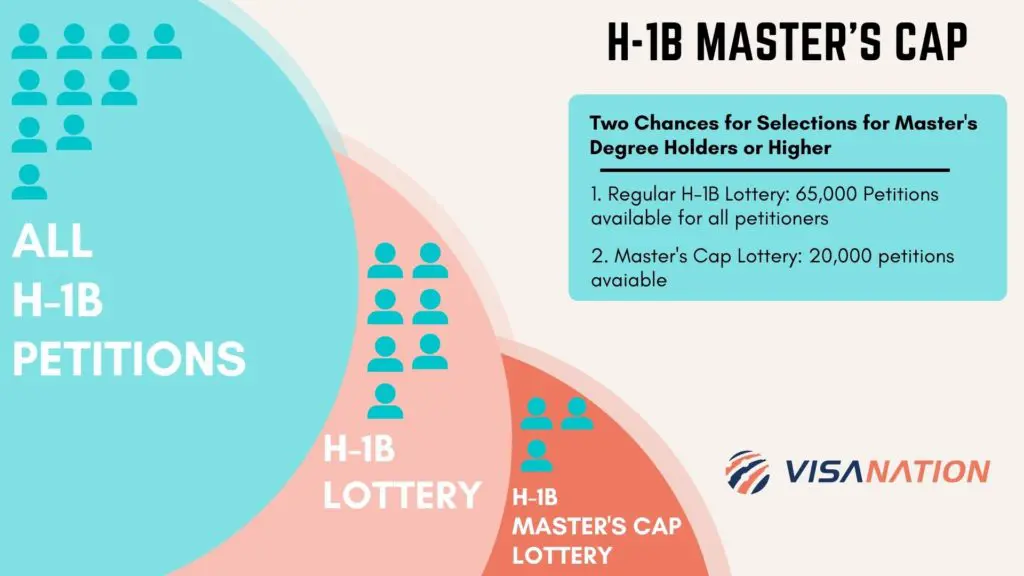
Who is Exempt from the H-1B Cap?
To qualify as a cap-exempt registration for an H-1B visa, the applicant must either have been previously counted against the H-1B cap or be offered a position with a cap-exempt employer. Cap-exempt employers are typically:
- Higher education institutions
- Non-profit organizations affiliated with higher education institutions
- Non-profit or government research organizations
- For-profit companies are hiring individuals for specialty occupations to work at any of the above three types of entities
Read how we got our client’s H-1B approved in weeks!
A non-profit organization or entity is tax-exempt and either of the following under the Internal Revenue Service (IRS): section 501(c)(3), (c)(4), or (c)(6) (see 26 U.S.C. 501(c)(3), (c)(4), or (c)(6)). Also, the IRS should approve the non-profit as a tax-exempt organization for research or educational services.
Additionally, if you are already an H-1B visa holder and want to transfer employers or extend your status, then you have already been counted against the cap, and your registration will be considered cap-exempt.
Keep in mind that transferring your status from one employer to the next has a caveat. If you originally came to the U.S. through a cap-exempt employer, transferring to another cap-exempt employer is not a problem. However, if you decide to transfer to a cap-subject employer, you will need to go through the lottery process.
Check out Top H-1B Transfer Denial Reasons.
What Happens if You’re Selected in the H-1B Lottery?
If you’re registration is selected in the H-1B lottery, USCIS issues an update using an I-797C, Notice of Action, indicating selection and providing details like:
- The employer’s name
- Identification number
- Confirmation number.
This notification confirms the registration’s selection for the congressionally mandated cap and specifies the dates within which the H-1B petition must be filed exclusively for the identified beneficiary.
Recommended read: the H-1B Grace Period.
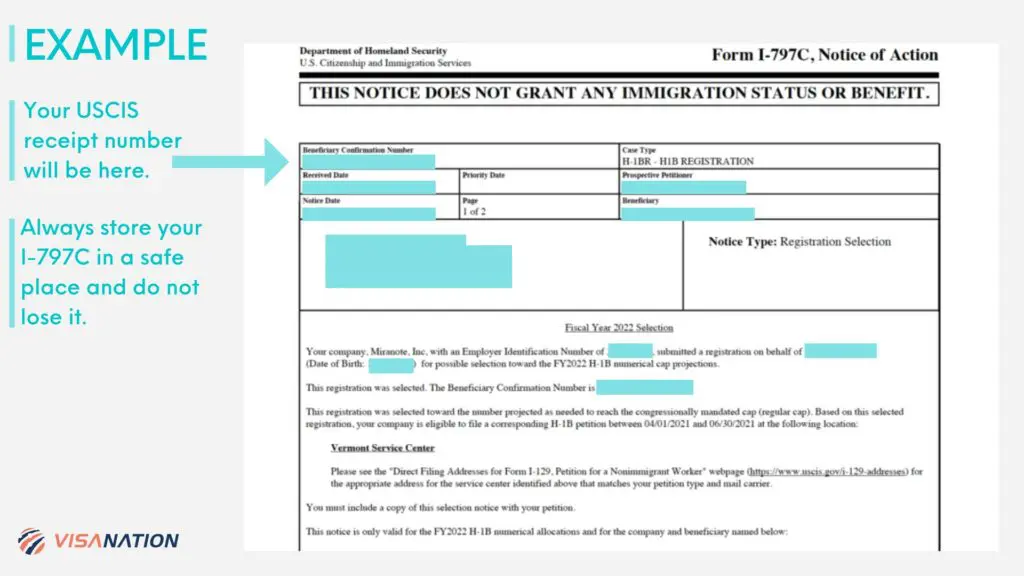
If you are selected in the H-1B lottery, your sponsor needs to:
- Obtain H-1B Labor Condition Application (LCA) approval: Before filing Form I-129, your sponsor must submit and receive approval for the LCA from the Department of Labor.
- File Form I-129: The H-1B petition must be submitted to USCIS within 90 days of receiving the selection notification.
- Include beneficiary details: The complete H-1B petition must include supporting documentation about the beneficiary, such as qualifications and job details.
- Receive USCIS receipt notice: Once USCIS receives the complete petition, they will issue a receipt notice. Premium processing is available for an additional $2,805, guaranteeing adjudication within 15 calendar days.
- Respond to USCIS requests: USCIS will review the petition and may issue additional status updates or Requests for Evidence (RFEs) if further information is needed, such as details on the beneficiary’s qualifications or the employer-employee relationship.
An immigration lawyer is the best person to handle the submission packet to ensure all necessary details are included.
The ideal scenario is receiving two updates after filing the petition:
- Case was Received
- Case was Approved.
If you don’t select premium processing, it can sometimes take upwards of six months.
Tip: Due to high filing volumes, there might be delays in receiving Form I-797 after filing the petition. Petitioners should avoid submitting a second petition even if they haven’t received Form I-797 but have delivery confirmation, as this could lead to both petitions being denied or revoked. If more than 30 days pass without receiving Form I-797 after confirmed delivery, petitioners should contact the USCIS Contact Center for assistance.
Current Filing Fees: 2026-2027 H-1B Visa Lottery Season
You can see the most up-to-date filing fees here. VisaNation Law Group has some of the most competitive filing fees, including responding to RFEs. Please see this page for a more detailed outline of our H-1B attorney fees.
Looking Back at Past H-1B Seasons
In recent years, the number of initial registrations has been trending higher, and the selection rate for initial registrations has been trending lower. Keep in mind that USCIS selects more than 85,000 registrations to account for
- Those selected candidates who end up not filing H-1B petitions
- Anticipated denials of H-1B petitions.
For example, in the fiscal year 2024 H-1B lottery season, USCIS received a significantly higher number of petitions compared to the previous year. Specifically, 758,994 H-1B cap-eligible registrations were submitted. From these submissions, USCIS selected a total of 188,400 registrations over multiple rounds to meet the H-1B quota, equating to an approximate selection rate of 24.8%.
H-1B Visa Chances (FY 2025-2026)
We calculated the rate of selection to be 21.8% in 2025. To calculate the selection rate, we divided eligible registrations (343,981) by available visas (78,200, which accounts for the 6,800 visas exclusive to Singaporean residents). Thus, the chances of selection were 22.7%.
Ineligible registrations
Last year, USCIS received a total of 358,737 H-1B registrations but of that number, only 343,981 were considered eligible. The pool of registrations that were not considered eligible was either:
- Duplicate registrations
- Those deleted by the prospective employer prior to the close of the registration period
- Did not complete payment
Note: USCIS did not provide any information regarding the breakdown of H-1B registrations between the Master’s quota and Regular quota, nor did they disclose any other metrics related to employers in FY 2025-26. While such data has been released in previous years, it was not this year.
H-1B Chances by Country
Do H-1B chances vary by country? No, because the process is completely random. Beneficiaries from every country have the same odds. Whether you live in India, Spain or anywhere else, your chances in the H-1B Lottery are the same.
Nonetheless, USCIS has developed some interesting graphics breaking down the gender and number of registrations by country in 2022. From the chart, you can see an overwhelming majority of registrations are from India and China. Additionally, men tend to make up most of the registrations in India, China, and Mexico, but the opposite is true for the Philippines.
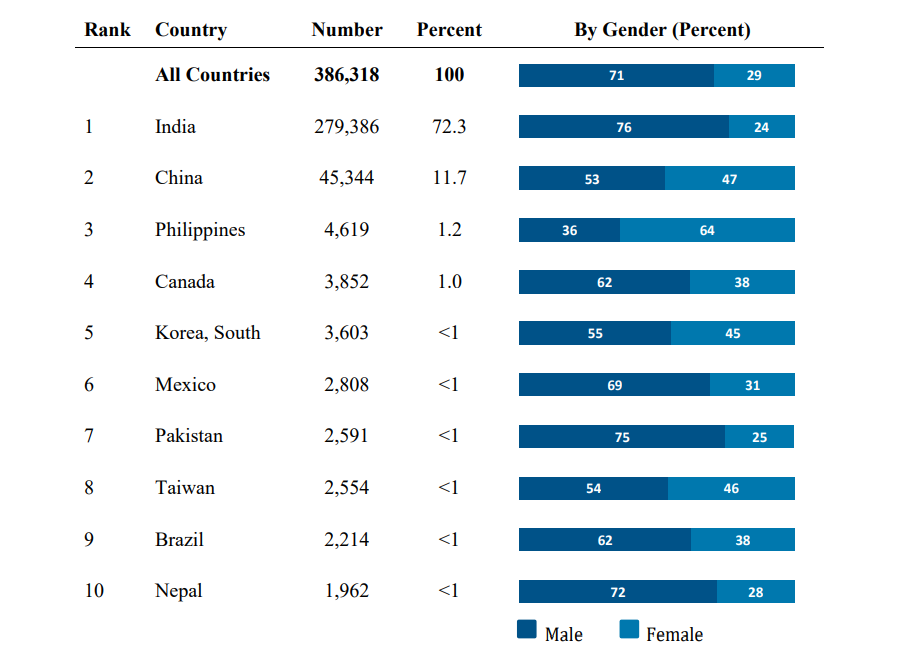
The Next Steps
As USCIS updates its policies and procedures, staying informed is paramount for immigration clients seeking to navigate the H-1B cap registration process for FY 2026. By understanding the latest developments and seeking professional guidance, applicants and employers can navigate the immigration landscape with confidence and clarity. If you have questions regarding your H-1B case it’s highly recommended to schedule a consultation with our H-1B legal experts.
Frequently Asked Questions FAQs
Does Premium Processing Increase My H-1B Lottery Odds?
Premium processing does not increase your H-1B probability. It is an optional service that the USCIS offers for certain petitions, the I-129 being one of them. The fee is $2,805, and USCIS will process a petition in 15 calendar days rather than in the standard amount of time, which can take upwards of six months.
Is the H-1B Lottery Really Random?
The H-1B lottery is currently entirely random. USCIS selects randomly from those who completed the H-1B registration accurately. Due to demand, USCIS randomly selects 85,000 registrations to be sent to processing. The demand is so high because the H-1B may seem easier due to the relatively low eligibility criteria compared to other nonimmigrant visas.
The H-1B visa requires you to:
- Have a job offer from a U.S. employer for a specialty position requiring a bachelor’s degree.
- Possess at least the required bachelor’s degree.
- Not be the sole proprietor of the sponsoring company.
The potential H-1B employer must fill out a Labor Certification Application for you.
This means that your employer must make four attestations to the Department of Labor:
- Your employment must not have a detrimental impact on the workers currently employed.
- The current employees must be notified of their employer’s intent to hire them.
- You must be paid the prevailing wage as a minimum. This is a wage that is calculated based on your position and geographic location.
- The job location must not be experiencing a lock-out or strike.









